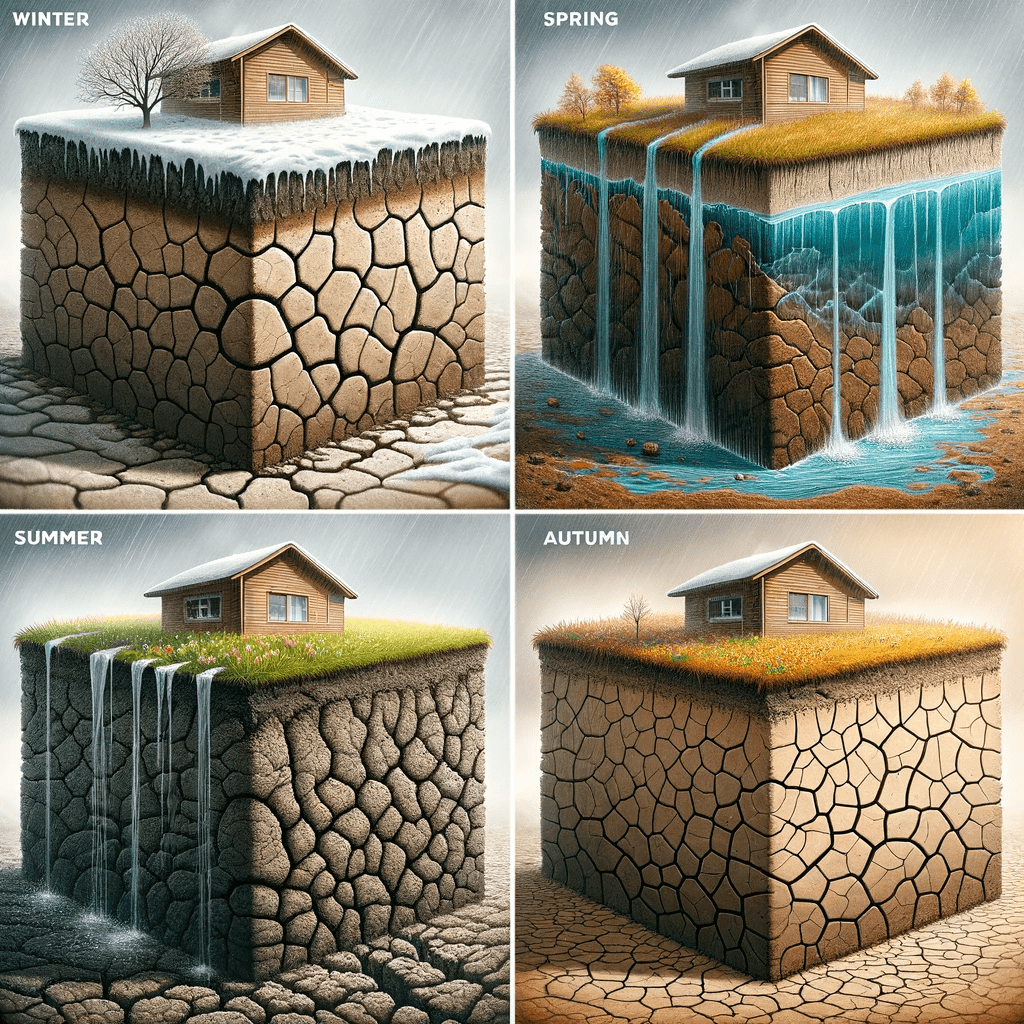Clay soil is a common feature in Texas, particularly in the Dallas-Fort Worth area. Its unique characteristics present various challenges for homes throughout the year. As a veteran-owned company known for its honesty, integrity, and commitment to providing peace of mind, Semper Fi Home Inspections has the expertise to help you navigate these challenges.
The Winter Woes: Clay Soil’s Impact on Homes During Colder Months
Understanding Clay Soil in Winter
Clay soil is unique in its response to temperature changes. In winter, as temperatures drop, clay soil tends to contract or shrink. This is more pronounced in clay than in other soil types due to its high moisture content and dense, compact structure. When the soil contracts, it can create gaps between the soil and the foundation of homes, unlike looser, sandier soils that don’t experience such dramatic volume changes.
Common Winter Home Issues
The gaps formed by contracting soil can destabilize the foundation. The foundation, lacking support in certain areas, can crack or even shift. This can lead to a range of structural issues in the home, including uneven floors, doors and windows that jam or won’t close properly, and visible cracks in walls and ceilings. These issues are not just cosmetic; they can significantly affect the home’s structural integrity and, over time, lead to costly repairs.
Semper Fi’s Winter Inspection Tips
Regular inspections during winter can help identify early signs of foundation movement. We recommend checking for cracks in both the interior and exterior of the home, monitoring door and window frames for changes, and ensuring that gutters and downspouts direct water away from the foundation, as improper drainage can exacerbate soil contraction problems.
Spring Showers Bring Soil Swells: Managing Clay Soil in Spring
Springtime Soil Expansion
With the spring rains, clay soil absorbs moisture and swells significantly, exerting pressure on home foundations. This expansion is more severe in clay soil due to its fine particles and low permeability, which trap water and expand. Other soil types with larger particles and higher permeability do not retain water to the same extent, leading to less expansion.
Navigating Drainage Challenges
The expanded soil can push against the foundation, leading to ‘heaving,’ where parts of the foundation are pushed upward. This can cause uneven floors, misaligned doors and windows, and cracks in the foundation. Proper drainage is essential to prevent excessive expansion of the clay soil and to mitigate these risks.
Seasonal Maintenance Advice from Semper Fi
Homeowners should maintain proper grading around the house to ensure water flows away from the foundation. We also recommend inspecting and cleaning gutters and downspouts and checking for any plumbing leaks that might worsen soil expansion issues.
The Heat is On: Summer and Dry Clay Soil
Summer Soil Shrinkage
During the hot summer months, clay soil dries out and shrinks. This shrinkage can be more extreme in clay soil compared to other types because of its tendency to hold onto water. When this water evaporates in the heat, it leaves the soil significantly reduced in volume.
Mitigating the Summer Strain on Homes
The shrinking soil can pull away from the foundation, removing support and leading to settling or sinking of the foundation. This settling can manifest as cracks in the foundation, walls, and ceilings, and can affect the overall alignment and stability of the house.
Semper Fi’s Summer Home Care Checklist
To combat this, homeowners should maintain a consistent moisture level around the home’s foundation. This can be achieved through regular watering of the foundation area and monitoring for gaps between the soil and foundation. We also recommend inspecting the foundation for new or widening cracks.
Falling into Trouble: Autumn Risks with Clay Soil
Autumn Soil Behavior
As the weather transitions in autumn, the soil moisture levels can fluctuate, leading to soil movement. This seasonal shift can be more problematic in clay soil due to its sensitivity to moisture changes.
Preparing for the Cold
This period is critical for preparing the home for winter. Homeowners should address any drainage issues to prevent water accumulation, which can lead to soil expansion, and ensure the soil around the foundation maintains a consistent moisture level to avoid shrinkage.
Semper Fi’s Autumn Inspection Guide
A thorough inspection in autumn can identify any issues that might worsen in the winter months. We recommend checking for signs of soil movement, such as new cracks in the foundation or changes in the level of the ground near the home, and taking proactive steps to address these issues.
Year-Round Vigilance: The Semper Fi Home Inspections Approach
Comprehensive Inspection Services
Semper Fi offers buyer, seller, new construction, and annual maintenance inspections, accompanied by over $2,500 in free warranty coverage with every complete home inspection.
Customized Solutions for Every Season
Their team provides tailored solutions for homes affected by clay soil throughout the year, using advanced techniques like thermal imaging inspections.
Building a Resilient Home
Regular inspections and maintenance are crucial for long-term home health and safety. Semper Fi’s commitment to same-day reports ensures prompt action can be taken to address any issues.
FAQ Section
Q: How does clay soil affect my home’s foundation? A: Clay soil expands when wet and shrinks when dry. This movement can cause your home’s foundation to shift, leading to cracks and structural damage.
Q: What type of home inspections does Semper Fi offer for homes with clay soil issues? A: Semper Fi offers a range of inspections, including buyer, seller, and annual maintenance inspections, which are crucial for homes in areas with clay soil. They also offer specialized services like thermal imaging to detect unseen problems.
Q: Can landscaping affect how clay soil impacts my home? A: Absolutely. Proper landscaping and drainage are key in managing the moisture levels in clay soil. This can prevent excessive expansion or shrinkage near your home’s foundation.
Q: How often should I have my home inspected if it’s built on clay soil? A: Semper Fi recommends annual inspections to monitor any changes in your home’s foundation (along with all of your home systems) and to address issues promptly.
Schedule an inspection with Semper Fi Home Inspections for personalized advice and solutions. With no trip fees in the DFW Metroplex and a commitment to providing detailed, same-day reports, Semper Fi is your partner in maintaining a healthy, resilient home.
For a professional home or commercial inspection in the Dallas/Fort Worth Metroplex that will provide you peace of mind, schedule your inspection now
Call
682-351-2267
or book online



